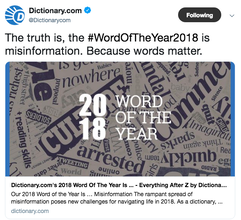Wee Words
The research required to complete the project is powerful—it makes the stakes of climate change clear and tangible, and it also illustrates the impact of language and usage on an incredibly high-stakes issue.
Most people implicitly know that if language doesn’t exactly shape the world, it nonetheless shapes our understanding of ourselves and our shared experiences. The fact that this knowledge is implicit (which is to say that it goes unexpressed) just makes it harder to really grasp how words can change comprehension.
The impact of language is more explicit in political discourse. Take “truthiness”—a word coined in 2005 to describe the tendency among politicians (and others) to vacillate on facts when politically expedient. In 2018, the phrase “fake news” is preferred, although it is most commonly deployed to undermine information with which the speaker does not agree, regardless of truth value. Both terms work to define “misinformation,” but in opposing ways that can change the sense of what constitutes “the truth.”
When it comes to climate change, Dr. Genevieve Gunther, director of endclimatescience.org, argues that language has shaped “the truth” so as to prevent action. In “Who is the We in ‘We Are Causing Climate Change?’” Gunther points out that the use of “we” defines a collective in which everyone is assigned equal blame. The problem? This is demonstrably false: Millions of people—in America and elsewhere—have nothing to do with a structural reliance on fossil fuel and couldn’t affect meaningful change no matter how hard they were to try.
While the job of “we” in any piece of writing is to establish a collective identity, by doing so, it establishes a boundary that can be coercive and—in the case of climate change—completely unhelpful. Using language that ensures that everyone is responsible effectively disables any one person from pointing out that some groups (people and entities) are a whole lot more responsible…and have the power to make the kind of real change that many, many people want.
It’s but a tiny word in the comprehensive ocean of language, but—like “misinformation” and “the truth”—”we” turn out to matter quite a lot.

